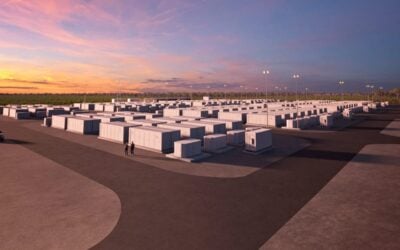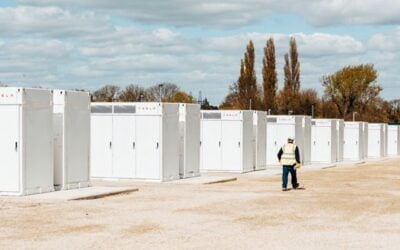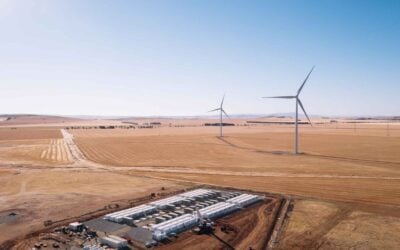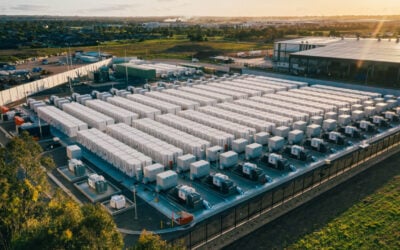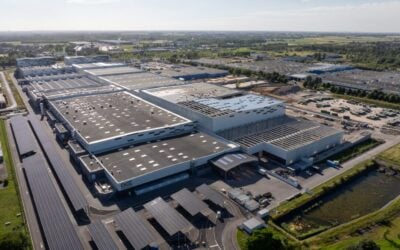UK politician Sajid Javid, the Secretary of State for Business, Innovation and Skills, at the opening of WMG’s new centre. Image: WMG.
Two initiatives have got underway in Europe, one in Germany and the other in Britain, aimed at accelerating battery development for electric vehicles and stationary storage respectively, while vacuum cleaner company Dyson has pledged a US$1.44 billion commitment to batteries – for cordless cleaning devices.
Germany’s Centre for Solar Energy and Hydrogen Research Baden-Württemberg (ZSW) has opened an industrial-scale pilot production plant for “automotive-grade” lithium-ion cells which was funded by the Federal Ministry of Education and Research and the local state of Baden-Württemberg. The ministry contributed €25.7 million (US$28.9 million) and the local state €6 million (US$6.7 million) in subsidies. ZSW announced that it has now marked a year of successfully manufacturing standard PHEV1 cells for electromobility.
On a production line more than 3000 square metres in area, using more than 11 kilometres of electrode sheeting, and over a tonne of active materials, the centre has been described as a “pre-competitive research platform”, with companies including BASF, BMW, Robert Bosch, Manz and Siemens contributing equipment and materials to the project.
In a statement, ZSW said the centre is an attempt by Germany to establish its own manufacturing bases for electric vehicle batteries. Daimler recently announced that it is putting around half a billion Euros into building its own factory and through its ACCUMOTIVE subsidiary the Mercedes-Benz brand owner has also established a partnership with fellow German company, solar inverter maker SMA, on stationary storage systems.
Try Premium for just $1
- Full premium access for the first month at only $1
- Converts to an annual rate after 30 days unless cancelled
- Cancel anytime during the trial period
Premium Benefits
- Expert industry analysis and interviews
- Digital access to PV Tech Power journal
- Exclusive event discounts
Or get the full Premium subscription right away
Or continue reading this article for free
Litarion, thought to be Germany’s biggest maker of electrodes and separators for lithium-ion batteries, was acquired by Canadian company Electrovaya last year.
UK’s Energy Innovation Centre treads similar path
Meanwhile, the UK’s University of Warwick, known for its technical and engineering faculties, opened a new £50 million (US$72 million) Energy Innovation Centre earlier this month. The university’s Warwick Manufacturing Group (WMG), which was founded to “reinvigorate UK manufacturing”, employs over 700 people.
The WMG facility includes a £13 million scale-up production line for battery materials, looking to take new battery chemistries and technologies from concept to industrial-scale testing. The centre’s remit will extend to super-capacitors and fuel cells and other related technologies in time, including inductive charging, but begins with its initial focus on batteries, WMG said.
The UK centre will also work on automotive battery technologies, with contributors including Nissan, Jaguar Land Rover and energy storage system maker Moixa joing a consortium to create the facility, called AMPLiFII (Automated Module-to-pack Pilot Line for Industrial Innovation). Other strands of related research will include a focus on sodium-ion batteries, which Moixa and partner Faradion says could be 30% cheaper to produce than lithium-ion is at present and could be relevant to solar storage.
Vacuum cleaner pioneer investing in £1 billion battery factory
UK-headquartered vacuum cleaner company Dyson has said it is investing around £1 billion (US$1.44 billion) in battery technology over the next five years. The company released its full-year financial reports for 2015 this morning, citing an increase in turnover figures of 26% over the previous year to £1.7 billion, with profits of £448 million.
The company, which bought battery start-up Sakti3 last year, made its name with “bagless” vacuum cleaners which trap household dirt and dust in a cyclonic chamber and reported strong sales and the growing importance of its cordless devices, which use rechargeable lithium-ion batteries.
Dyson is thought to be focusing on improving the batteries in its existing range of devices but in recent years has diversified its product offering from vacuum cleaners to include humidifiers, hand dryers and other devices.
Solar Media is hosting the Energy Storage Summit at Twickenham Rugby Stadium, London on 28 April as part of the UK Clean Energy Summit.

